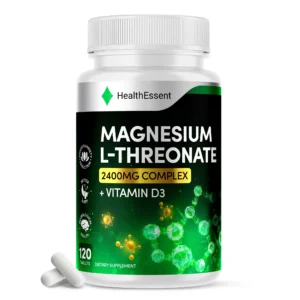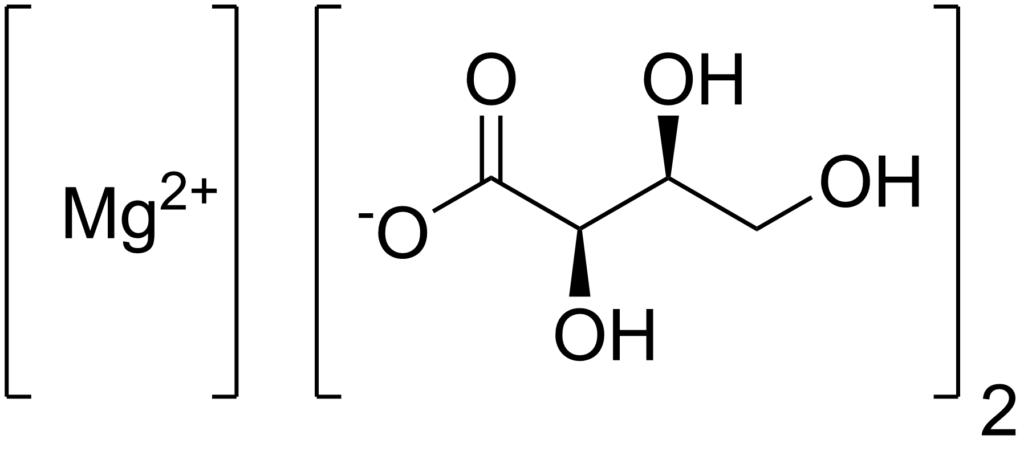When choosing a magnesium supplement, it’s important to understand the differences between magnesium L-threonate and magnesium glycinate. Both are popular forms of magnesium, but they work differently in our bodies. Let’s explore what makes each of them unique and which one might be better for you.
1. What is Magnesium?
Magnesium is a mineral that our bodies need to work well. It helps our muscles move, keeps our heart beating strong, and helps us sleep better at night. We get magnesium from foods like nuts, seeds, and green leafy vegetables. Sometimes, though, we need more magnesium than we can get from food, so people take magnesium supplements to make sure they have enough.
Magnesium is also important for our bones and teeth. It helps them stay strong so we can run, jump, and play without getting hurt. Our bodies use magnesium in lots of different ways, like making energy and helping our nerves work properly. Without enough magnesium, we might feel tired, get muscle cramps, or have trouble sleeping.
People take different kinds of magnesium supplements to help with different things. Some types of magnesium are better for our muscles, while others might be good for our brains. It’s important to choose the right kind of magnesium based on what we need it to do for us.

2. Why Do We Need Magnesium?
We need magnesium because it helps our bodies do lots of important jobs. One big job magnesium does is help our muscles move and relax. When we run, jump, or even just walk, our muscles use magnesium to work properly. Magnesium also helps our hearts stay strong by keeping our heartbeats regular.
Another important job magnesium does is help our brains work well. It helps us think, learn, and remember things better. When we sleep at night, magnesium helps our bodies relax so we can have good dreams and wake up feeling rested. Without enough magnesium, we might feel cranky, have trouble focusing, or even get headaches.
Magnesium is also good for our bones. It helps keep them strong so we can grow up to be big and strong. When we’re young, our bodies need lots of magnesium to grow and stay healthy. Even when we’re older, magnesium keeps our bones strong so we can keep doing all the things we love to do.
3. Understanding Magnesium L-Threonate
Magnesium L-threonate is a special kind of magnesium supplement that some people like to take because they think it’s good for their brains. It’s made by mixing magnesium with something called L-threonate. This special mix helps the magnesium get into our brain cells better so it can do its job.
People who take magnesium L-threonate often do it to help with memory and thinking skills. They think it helps their brains stay sharp and focused, which can be really important as we get older. Some studies have shown that magnesium L-threonate might be better for our brains than other kinds of magnesium.
One thing to remember about magnesium L-threonate is that it might not be good for everyone. It’s important to talk to a doctor before starting any new supplement to make sure it’s safe for us. They can help us decide if magnesium L-threonate is a good choice based on our age, health, and what we want it to do for us.
4. Exploring Magnesium Glycinate
Magnesium glycinate is another type of magnesium supplement that lots of people like to take. It’s made by mixing magnesium with something called glycine, which is an amino acid. This special mix helps the magnesium get into our bodies easier so it can do its job without upsetting our stomachs.
People who take magnesium glycinate often do it to help relax their muscles and feel less stressed. It’s good for people who have trouble sleeping or who get muscle cramps. Magnesium glycinate is also gentle on our stomachs, which means it doesn’t usually cause problems like diarrhea or stomachaches.
One good thing about magnesium glycinate is that it’s easy for our bodies to use. When we take magnesium glycinate, our bodies can absorb it quickly so it can start helping right away. This can be really important if we need something to help us feel better fast.
5. How Magnesium L-Threonate Works
Magnesium L-threonate works in a special way to help our brains. It’s made to get into our brain cells better than other kinds of magnesium. When it gets into our brain cells, it can help them work better and stay healthy. This can be really important for things like memory and thinking skills.
People who take magnesium L-threonate often do it to help with brain fog or forgetfulness. They think it helps their brains stay sharp and focused so they can remember things better. Some studies have shown that magnesium L-threonate might even be better for our brains than other kinds of magnesium.
One thing to remember about magnesium L-threonate is that it might not work the same for everyone. Some people might see big changes in their memory and thinking skills, while others might not see much difference. It’s important to talk to a doctor before starting any new supplement to make sure it’s safe for us and will do what we want it to do.
1. What is Magnesium?
Magnesium is a vital mineral that our bodies need to function properly. It plays a key role in over 300 biochemical reactions, helping with everything from energy production to muscle function and bone health. We can get magnesium from foods like nuts, seeds, leafy greens, and whole grains. However, sometimes we might not get enough from our diet alone, so people often take magnesium supplements to ensure they meet their daily needs.
Beyond its role in physical health, magnesium is also important for mental well-being. It helps regulate neurotransmitters, which are chemicals that send signals throughout the brain and nervous system. This means magnesium not only supports our muscles and bones but also helps us feel calm and focused.
When choosing a magnesium supplement, it’s important to consider different forms like magnesium glycinate or magnesium citrate. Each form may have unique benefits and absorption rates, so finding the right one depends on your specific health goals and any dietary considerations you may have.
2. Why Do We Need Magnesium?
Our bodies rely on magnesium for a variety of essential functions. One of its primary roles is in muscle contraction and relaxation. Without enough magnesium, our muscles can cramp and feel stiff. Additionally, magnesium is crucial for maintaining a healthy heartbeat and supporting cardiovascular function. It helps regulate our heart rhythm and blood pressure, contributing to overall heart health.
Magnesium also plays a key role in energy metabolism. It helps convert food into energy, which is essential for everyday activities and exercise. This mineral is involved in ATP (adenosine triphosphate) production, which is like a fuel source for our cells. So, having enough magnesium can help us feel more energetic and less fatigued.
Another important reason we need magnesium is for bone health. It works together with calcium and vitamin D to keep our bones strong and dense. Without enough magnesium, our bones can become weaker and more prone to fractures.
In summary, magnesium is essential for muscle function, heart health, energy production, and bone strength. Choosing the right magnesium supplement depends on your specific health needs and any potential deficiencies you may have.
3. Understanding Magnesium L-Threonate
Magnesium L-threonate is a specialized form of magnesium that has gained attention for its potential cognitive benefits. Unlike other forms of magnesium, L-threonate is thought to cross the blood-brain barrier more effectively. This means it can reach brain cells and potentially enhance cognitive functions like memory and learning.
Research suggests that magnesium L-threonate may support synaptic plasticity, which is the ability of brain cells to form new connections. This could be beneficial for maintaining cognitive function, especially as we age. Some studies have shown promising results in improving memory and cognitive performance in older adults.
One of the unique aspects of magnesium L-threonate is its formulation. It combines magnesium with L-threonate, a compound that may enhance its bioavailability and brain uptake. This targeted approach makes magnesium L-threonate a popular choice among individuals looking to support brain health and cognitive function.
When considering magnesium L-threonate, it’s important to consult with a healthcare provider to determine if it aligns with your health goals and if it’s suitable for your individual needs. While it shows promise for brain health, more research is needed to fully understand its long-term effects and benefits.
4. Exploring Magnesium Glycinate
Magnesium glycinate is a form of magnesium that is chelated with glycine, an amino acid. This combination enhances the absorption of magnesium in the body, making it easier on the stomach compared to other forms. People often choose magnesium glycinate for its gentle nature and lower likelihood of causing digestive discomfort.
One of the primary benefits of magnesium glycinate is its ability to promote relaxation and reduce muscle tension. It has a calming effect on the body, which can be particularly helpful for individuals who experience stress or difficulty sleeping. By supporting muscle relaxation, magnesium glycinate may also help alleviate symptoms of muscle cramps or spasms.
Additionally, magnesium glycinate is well-tolerated by most individuals, including those with sensitive stomachs. It is less likely to cause diarrhea or loose stools compared to magnesium oxide or citrate. This makes it a preferred option for people who want to supplement with magnesium without experiencing gastrointestinal side effects.
Overall, magnesium glycinate is valued for its bioavailability, gentle nature, and ability to promote relaxation. It remains a popular choice among individuals seeking to support overall well-being and maintain healthy magnesium levels in the body.
5. How Magnesium L-Threonate Works
Magnesium L-threonate works differently compared to other forms of magnesium because of its unique ability to cross the blood-brain barrier effectively. This allows it to reach brain cells more efficiently and potentially enhance cognitive functions such as memory and learning. By increasing magnesium levels in the brain, L-threonate may support synaptic plasticity, which is essential for forming new connections between neurons. This neurological support makes magnesium L-threonate a popular choice for those looking to boost brain health and cognitive performance.
Research into magnesium L-threonate suggests promising results in improving memory and cognitive function, particularly in older adults who may experience age-related cognitive decline. Studies have shown that supplementation with magnesium L-threonate can help maintain cognitive abilities and support overall brain function. However, more research is needed to fully understand its long-term effects and benefits on cognitive health.
When considering magnesium L-threonate, it’s important to consult with a healthcare provider to determine if it aligns with your health goals and if it’s suitable for your individual needs. While it shows promise for brain health, individual responses may vary, and professional guidance can help ensure safe and effective supplementation.
6. Benefits of Magnesium Glycinate
Magnesium glycinate offers several benefits that make it a popular choice among individuals seeking to support overall health and well-being. One of the primary advantages of magnesium glycinate is its gentle nature on the digestive system. Unlike other forms of magnesium that can cause gastrointestinal discomfort, magnesium glycinate is less likely to cause diarrhea or stomach upset. This makes it suitable for individuals with sensitive stomachs or those prone to digestive issues.
Another significant benefit of magnesium glycinate is its ability to promote relaxation and reduce muscle tension. By supporting muscle relaxation, magnesium glycinate may help alleviate symptoms of muscle cramps, spasms, and general muscle discomfort. This can be particularly beneficial for athletes, individuals with physically demanding jobs, or anyone experiencing muscle tightness or stress-related tension.
Additionally, magnesium glycinate is well-absorbed by the body due to its chelated form with glycine, an amino acid that enhances absorption. This ensures that more magnesium reaches the bloodstream and is available for use in various physiological processes. Maintaining adequate magnesium levels is important for overall health, as it supports energy production, nerve function, and cardiovascular health.
Overall, magnesium glycinate is valued for its gentle absorption, digestive tolerance, and ability to promote relaxation and muscle comfort. It remains a preferred choice for individuals looking to supplement with magnesium to support their daily health and wellness goals.
7. Which Form Absorbs Better?
When comparing different forms of magnesium supplements, absorption rate is an important consideration. Magnesium glycinate is known for its high absorption rate compared to other forms like magnesium oxide or citrate. This means that more magnesium from glycinate supplements is absorbed into the bloodstream and available for use by the body.
The absorption of magnesium depends on several factors, including the form of magnesium used and individual differences in digestive health. Magnesium glycinate, due to its chelated form with glycine, is readily absorbed in the small intestine. This enhances its bioavailability and reduces the likelihood of gastrointestinal side effects such as diarrhea or stomach cramps.
In contrast, magnesium oxide, while commonly found in supplements, has lower absorption rates and may cause gastrointestinal discomfort in some individuals. It is often used as a laxative due to its ability to draw water into the intestines, which can lead to softer stools and relief from constipation.
When choosing a magnesium supplement, it’s important to consider absorption rates and potential side effects. Opting for forms like magnesium glycinate, which are well-absorbed and gentle on the stomach, can help ensure effective supplementation without digestive issues.

Conclusion
Magnesium is super important for our bodies to work well. It helps our muscles move, keeps our hearts beating strong, and even helps our brains stay sharp. We can get magnesium from foods like nuts, seeds, and green veggies, but sometimes we need a little extra help from supplements.
Choosing the right magnesium supplement depends on what we need it to do for us. If we want something gentle on our tummies and good for relaxing, magnesium glycinate might be the way to go. But if we’re looking to boost our brainpower and memory, magnesium L-threonate could be a good choice. Remember, it’s always a good idea to talk to a grown-up or doctor before starting any new supplement to make sure it’s safe and right for us.
Magnesium helps us stay strong, healthy, and ready to take on the day. Whether it’s playing sports, learning new things, or just feeling good, having enough magnesium is key to keeping our bodies and minds in tip-top shape!





More Stories
How to Avoid Common Mistakes in Construction Estimation
Virtual Character Interactions The Next Frontier in AI Technology
Leveraging Video Content for Improved Cannabis SEO: The Role of Latched Agency